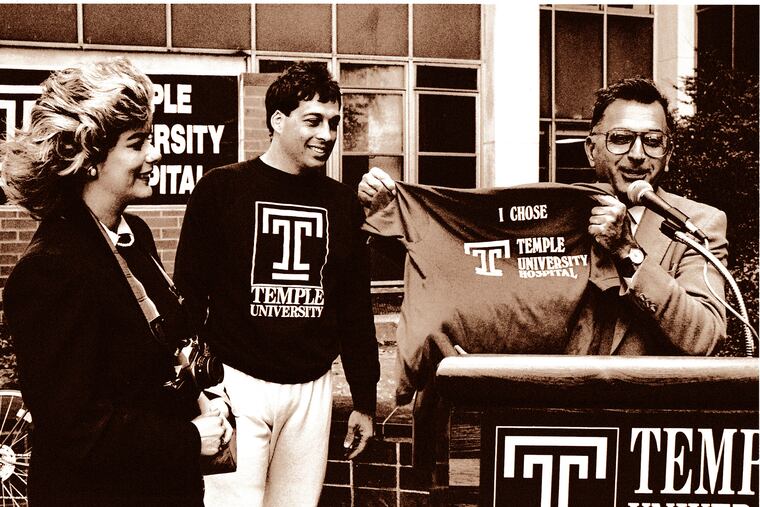Who is your everyday Philly hero?
My brother, Joe Miceli, will never be on the cover of Time magazine, but he is extraordinary.

‘Tis the season when extraordinary actions get you on the cover of Time magazine. I don’t have a quarrel with Ukraine’s president getting the nod this year. Volodymyr Zelensky is a striking example of selflessness and courage. The man is bigger than life.
But what of the men and women in our lives who, let’s say, are only about as big as life? They’ll never be on Time’s cover, but we know who they are: ordinary people doing extraordinary things while under great pressure. We look at them and say, “I want to be more like that.”
Take my brother, Joe Miceli. In 1978, he turned 20, and felt like he was on his way. He planned to marry his high school sweetheart, Carol, work at the DuPont factory in Grays Ferry, buy a house, have kids, and live the American dream.
As we all know, plans have a way of getting shipwrecked. Joe was struck with lupus before he got married. The disease tried to kill him several different ways, attacking his brain, kidneys, central nervous system, and other organs.
In those first years after his diagnosis, he fell into a coma, blew up like a blowfish, had a continuous fever that peaked at 105, and during a delirious episode at Temple University Hospital, tried to jump out of a window.
Doctors scrambled to find the secret sauce, the complicated cocktail of drugs that would save Joe’s life. They filled him with corticosteroids, immunosuppressants, and other drugs. After a lot of trial and error, Joe began to respond.
It was well into the fourth year of the disease that things started to turn around, and Joe entered a prolonged remission. He told us that, while asleep one night he heard a voice in a dream say, “Everything will be OK” That voice changed Joe’s view of his life. He decided that he would take advantage of this precious gift of recovery by doing what he could for other people.
He helped family, friends, and others repair or rebuild just about anything in a house or parked in a driveway. He used his football skills from high school to coach St. Eugene’s parish junior high team in Primos, Delaware County. He met with fellow lupus patients, listening to them and encouraging them.
While he was doing all of this, he put himself through a rigorous conditioning program so he could bike with our brother, a cancer survivor, 60 miles from Philadelphia to Smithville, N.J., in 1985 to raise money for the American Cancer Society.
One of Joe’s doctors gave him a donation for the ride, then said, “Next time do it for lupus.”
And that’s exactly what he did. When his doctors and the Lupus Foundation of America nixed his idea of biking across the country, he turned to his good friend, ophthalmologist Mike DellaVecchia, to help design a round trip from Philadelphia to Pittsburgh to raise money for lupus research at Temple University Hospital.
Stephen Berney, the rheumatologist who was instrumental in saving Joe’s life, was concerned that the 700-mile ride would cause a relapse. “That bike ride is a very unusual thing for a lupus patient — even now,” Berney told me recently. “It demonstrates an incredible amount of stamina and an incredible amount of resolve.”
Joe raised $21,000, a respectable amount of money in 1987. He completed the bike ride and did not relapse.
He’s had more ups and downs with lupus over the years, but he’s weathered the squalls with Carol’s help. She never let the choppy waters pull Joe under. Since the ride, he and Carol adopted two children. He continued doing volunteer work — organizing food collections for a women’s shelter in Philadelphia — while also working full time for a cable company. He and Carol live in Chadds Ford.
I’m sure you have Joe Micelis in your world. People who have learned a lot from suffering. Learned somehow to be grateful. They make you realize that despite the hard blows they’ve absorbed, they’ve found something wonderful about this life.
Who needs their face on the cover of Time?
Alan Miceli is a retired public television documentary producer, a former news producer at 6abc, and the former editor of The Philadelphia County Medical Society Magazine.